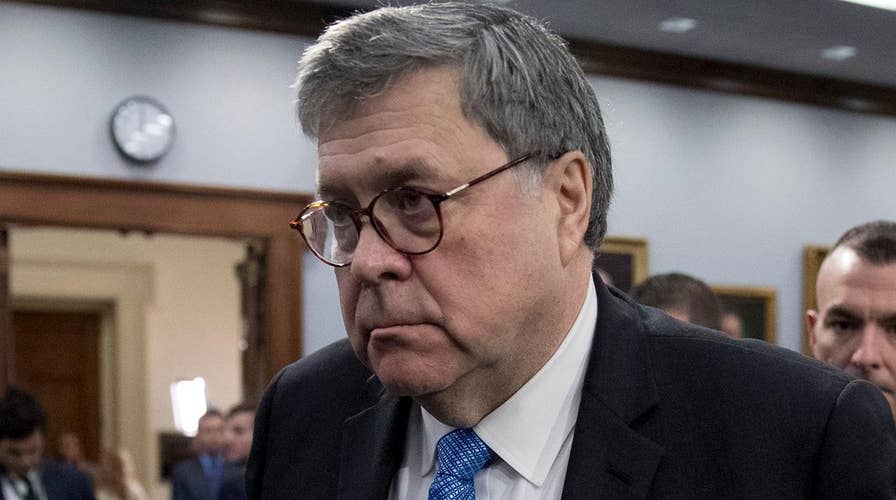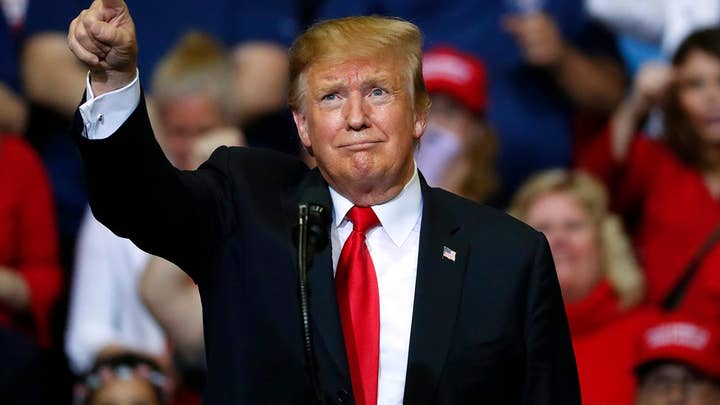Why are Democrats upset that Attorney General Bill Barr said that the 2016 Trump campaign was spied on?
Former deputy independent counsel Sol Wisenberg weighs in on Attorney General Bill Barr's Capitol Hill testimony.
Attorney General Bill Barr ran into a buzz saw of criticism from Democratic lawmakers and media figures for testifying Wednesday that “spying did occur” against the Trump campaign in 2016. But despite the backlash, Barr appeared to be referring to intelligence collection that already has been widely reported and confirmed.
Foreign Intelligence Surveillance Act (FISA) warrants against former Trump campaign aide Carter Page are currently the subject of a Justice Department inspector general investigation looking at potential misconduct in the issuance of those warrants. That review also reportedly is scrutinizing the role of an FBI informant who had contacts with Trump advisers in the early stages of the Russia investigation.
DEMS RAGE AGAINST BARR FOR BACKING CLAIMS OF TRUMP CAMPAIGN 'SPYING' BY FBI
When asked about the controversy surrounding Barr’s remarks, a person familiar with his thinking denied that he was trying to fuel conspiracy theories or play to the conservative base.
“When he used the word spying, he means intelligence collecting,” the source told Fox News, also noting Barr’s history as a CIA analyst in the 1970s. “He wasn’t using it in a pejorative sense, he was using it in the classic sense.”
The Oxford Dictionary defines ‘spying’ as: “to collect information about something to use in deciding how to act,” or to “observe furtively.”
The use of the term as it applies to the FBI's surveillance in 2016 has been fiercely disputed. The New York Times, even as it reported last year on how the FBI sent an informant to speak to campaign advisers amid concerns about suspicious Russia contacts, stated that this was to "investigate" Russia ties and "not to spy."
But Barr's testimony suggests he makes no distinction between the two. He also stressed that the question for him is whether that "spying" was justified.
“I think spying did occur. The question is whether it was adequately predicated,” Barr testified Wednesday, adding that he believed it is his “obligation” to review whether there was misconduct in the original investigation. “Congress is usually very concerned with intelligence agencies and law enforcement agencies staying in their proper lane.”
He added that “spying on a political campaign is a big deal.”
President Trump backed the attorney general's testimony, saying Thursday: “I think what he said was absolutely true. There was absolutely spying into my campaign.”
Democrats, though, charged that this week's testimony indicated Barr was a compromised witness.
“He is acting as an employee of the president,” House Majority Leader Steny Hoyer, D-Md., said. “I believe the attorney general believes he needs to protect the president of the United States.”
House Speaker Nancy Pelosi, D-Calif., told the Associated Press that she doesn’t “trust Barr,” but she trusts Special Counsel Robert Mueller. Senate Minority Leader Chuck Schumer, D-N.Y., later accused Barr of “peddling conspiracy theories.”
Media figures and outlets also panned Barr's use of the term, with some declaring he had provided no evidence for it.
NBC News’ Chuck Todd accused the attorney general of giving credence to a “conspiracy theory.”
“Using the word spying,” the “Meet the Press” moderator said, “plays into the president’s language and argument that the Russia investigation to him is just a witch hunt, and every time they’ve brought up this allegation, there has been zero factual basis for it.”
Conservatives in the media sphere pushed back. The Federalist's Mollie Hemingway tweeted, "There is no dispute about whether spying occurred. There has not yet been a proper investigation about whether that spying--which included human informants, wiretaps, national security letters, etc.--can be justified."
House Intelligence Committee Chairman Adam Schiff, D-Calif., also said Barr “should not casually suggest that those under his purview engaged in ‘spying’ on a political campaign.”
“This type of partisan talking point may please Donald Trump, who rails against a ‘deep state coup,’” Schiff said. “But it also strikes another destructive blow to our democratic institutions. The hardworking men and women at the DOJ and FBI deserve better.”
But Barr did not criticize the Justice Department or the FBI as a whole, instead noting he was looking at the “upper echelons” of leadership at the bureau at the time as he confirmed he was reviewing the “conduct of the investigation” that began in the summer of 2016.
“Frankly, to the extent there were issues at the FBI, I do not view it as a problem of the FBI. I think it was probably a failure of the group of leaders—the upper echelons of the FBI. I think the FBI is an outstanding organization and I am very pleased Director Chris Wray is there,” he said.
Barr was pressed about his claim of “spying” during the Senate hearing Wednesday, with Democrat Brian Schatz asking for Barr to be more “precise” in his wording.
“I want to make sure there was no unauthorized surveillance,” Barr responded.
Whether proper or improper, the issue of surveillance of the Trump campaign has been widely documented.
The FISA warrants, for example, were the subject of a GOP House Intelligence Committee memo last year. That memo alleged the unverified anti-Trump dossier provided much of the basis for law enforcement officials to repeatedly secure FISA warrants against Page, though Democrats have pushed back on parts of the GOP report.
COMEY MEMOS CONTAINED FAR MORE SENSITIVE INFO THAN PREVIOUSLY KNOWN, FBI FILING REVEALS
Meanwhile, as part of Justice Department Inspector General Michael Horowitz’s investigation, he is reportedly probing the involvement of FBI informant Stefan Halper—whose role first emerged last year.
Halper, an American professor who reportedly is connected with British and American intelligence agencies, has been widely reported as a confidential source during the FBI's original investigation. That official counterintelligence operation was opened by then-senior agent Peter Strzok, who has since been fired from the bureau.
During the 2016 campaign, Halper reportedly contacted several members of the Trump campaign, including former foreign policy adviser George Papadopoulos and Page. Halper also reportedly contacted former campaign aide Sam Clovis.
Meanwhile, the Trump campaign was a clear focus of the FBI’s 2016 counterintelligence investigation looking at suspicious Russia contacts.
Former FBI Director James Comey testified that when the agency initiated its counterintelligence probe into possible collusion between Trump campaign officials and the Russian government, investigators "didn't know whether we had anything" and that "in fact, when I was fired as director [in May 2017], I still didn't know whether there was anything to it."
Fox News’ Jake Gibson, Gregg Re, Joseph A. Wulfsohn and Chad Pergram contributed to this report.















































